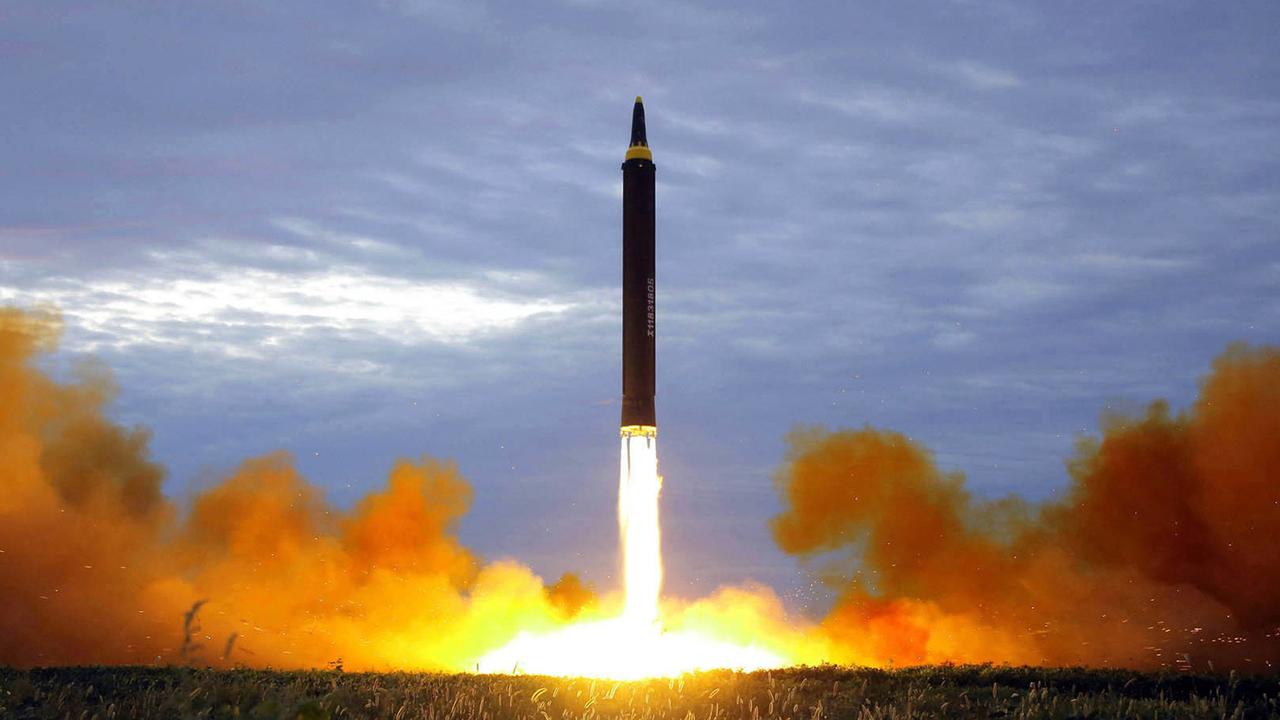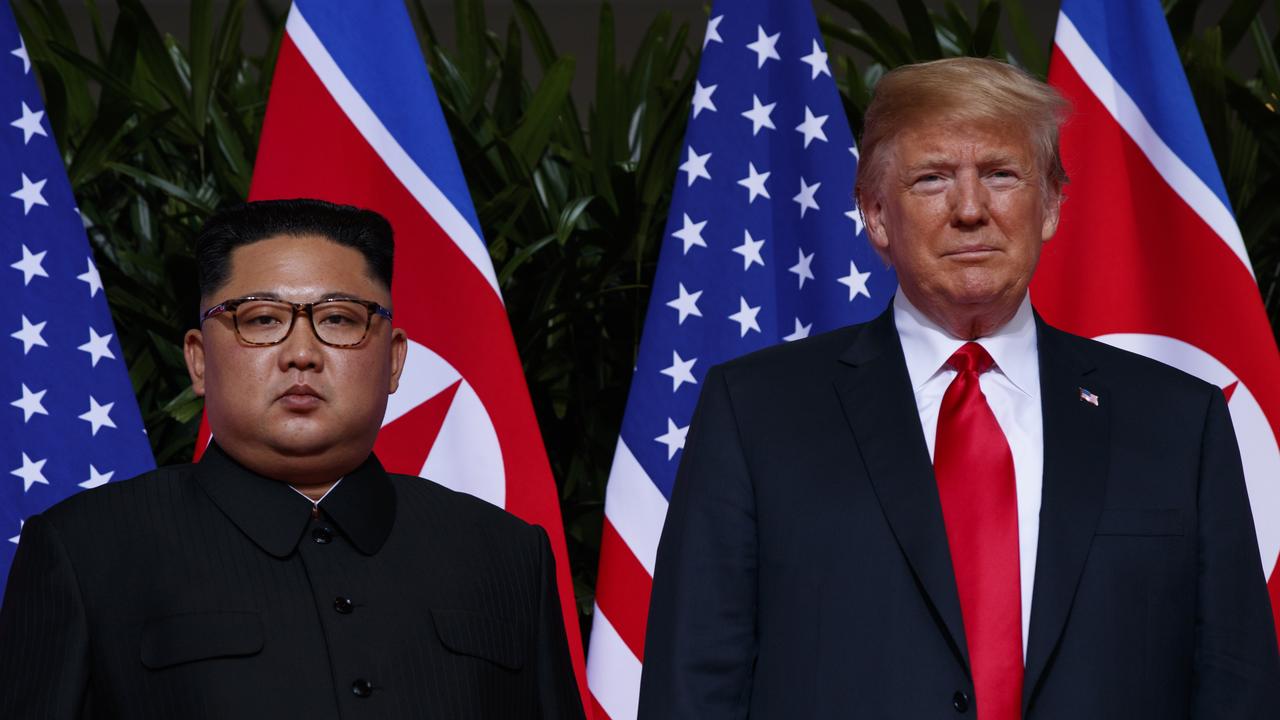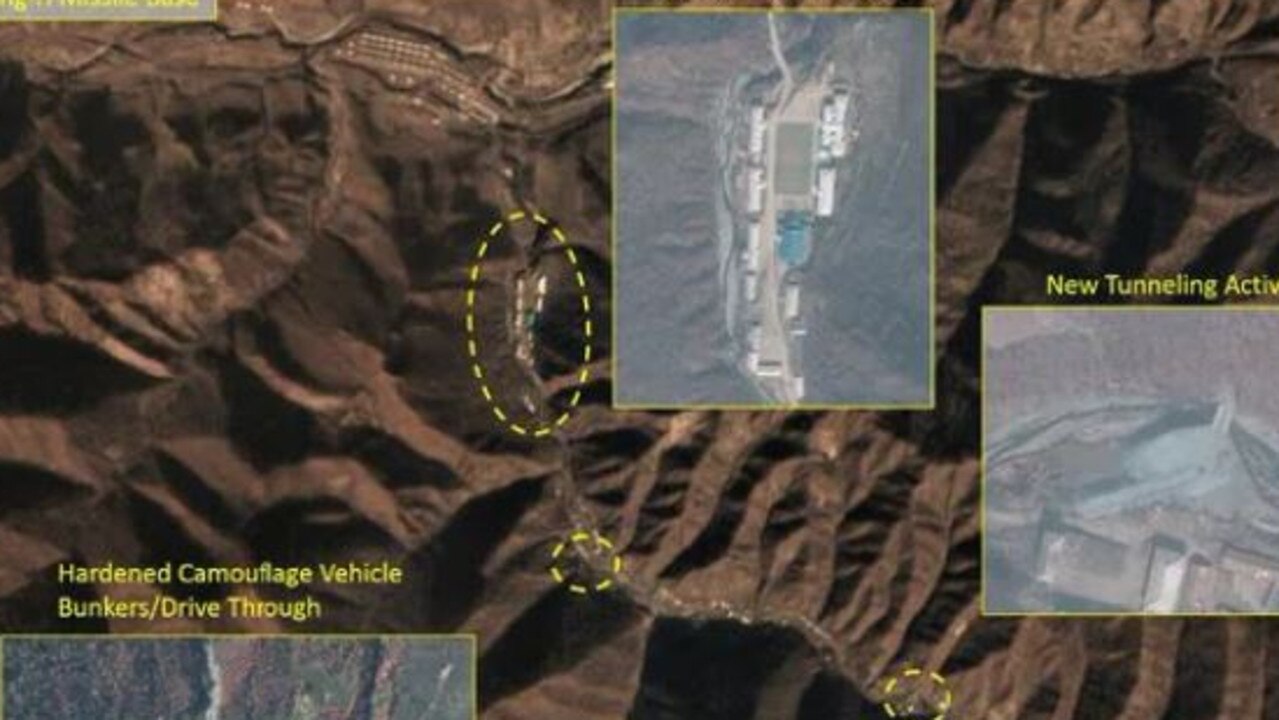‘North Korea remains a nuclear threat’: Donald Trump’s administration at odds with POTUS over upcoming summit
As Donald Trump and Kim Jong-un prepare for their second face-to-face, the President’s own administration is worried about what he’ll say behind closed doors.
Gone are the days of “little rocket man” insults being traded between Donald Trump and Kim Jong-un.
But as the two leaders prepare to meet in Vietnam on February 27-28, experts have warned there’s a much bigger problem than a Twitter-initiated war of words.
It’s the prospect of Mr Trump getting Mr Kim alone and unsupervised, where he could privately agree to give away too much to North Korea in exchange for too little.
When the pair had their first highly-publicised meeting in Singapore last June, one of the main criticisms to follow was that Mr Trump gave the North Korean dictator the gift of legitimacy in exchange for a vaguely-worded promise to denuclearise.
He also extended a suspension of major joint military exercises with South Korea.
In exchange, North Korea’s promises to denuclearise came with no detail, and did not go as far as previous commitments it has made and broken, including one from 2005. Mr Kim made no explicit undertakings to give up his nuclear program and gave no timeline for dismantling it.
MORE: What to expect from Trump-Kim summit

Since the first summit, much doubt has been cast on whether North Korea actually has begun its denuclearisation process.
Just a couple of months ago, commercial satellite photos obtained by CNN revealed Mr Kim had been rapidly expanding Yeongjeo-dong, a key long-range missile base.
Under the nuclear disarmament agreement, the base should have been deactivated.
But, according to the Middlebury Institute report: “Satellite images show that the base remains active. Moreover, in the past year North Korea has significantly expanded a nearby facility (known as Hoejung-ri) that appears to be another missile base.”
"Construction on the previously unidentified site has continued even after the Singapore Summit," @ArmsControlWonk of @CNS_Updates tells @CNN. "Whatever Kim says [re: denuclearization], #NorthKorea continues to produce and deploy nuclear armed missiles." https://t.co/NT3Rauhbw4
— Middlebury Institute (@MIIS) December 5, 2018
Here are the main things worrying experts about the upcoming Hanoi summit:
A PIECEMEAL DEAL
South Korean papers have been filled with unidentified government sources suggesting that Mr Trump and Mr Kim might strike a deal that stops far short of the road map for the full denuclearisation of the North that the United States has long insisted on.
Instead, Mr Kim could agree to give up only part of his arsenal — his intercontinental missiles aimed at America, for instance, or his main nuclear reactor — in return for an easing of harsh sanctions.
There’s also fear that Mr Trump will eventually orchestrate some sort of drawdown of US troops from South Korea or an extended halt to US-South Korean military drills.
For Mr Trump, such a deal could generate a rush of “breakthrough” headlines to help assure supporters he’s protecting the American mainland.
Mr Kim, for his part, would be taking a huge step toward cementing the North as a nuclear weapons state and, as a bonus, driving a wedge in the US-South Korea alliance that the North maintains is aimed at the overthrow of the Kim family — all without addressing the North’s arsenal of short- and mid-range nuclear armed missiles aimed at Seoul, Tokyo and other parts of Asia.
Those in favour of this kind of piecemeal deal say it’s simply a matter of accepting reality: North Korea won’t give up nukes it sees as crucial to deterring what it calls US hostility, so the wise move is to work to first limit or freeze the program’s most worrisome aspects and then work toward total denuclearisation.
Skeptics say this would give the North too much in return for too little. They want instead something that first forces Pyongyang to list the particulars of its nuclear program, then allows outsiders to verify the list and see the program demolished.
“Ad hoc deals or piecemeal negotiations absent an agreed-on road map would allow Pyongyang to dictate the terms, pace and duration of the diplomatic process without making a dent in North Korea’s nuclear arsenal,” Duyeon Kim, a Korea expert at the Center for a New American Security, recently wrote.
“There is a serious risk of Trump ad libbing his way into a bad deal, as he did in Singapore in June 2018, by relinquishing vital bargaining chips that disadvantage US interests and Asian allies’ security,” she added.
KIM AND TRUMP ARE TOO ALIGNED
There’s a joke being shared by some North Korea experts: Did you hear that Kim Jong-un and Donald Trump both want the same thing from their Hanoi summit? The United States out of South Korea.
Funny or not, the dark humour gets at serious doubts churned up by Mr Trump’s repeated public expressions of a deep wariness about the US-South Korea alliance that many in Seoul and Washington see as a linchpin of Northeast Asian security.

The best example may be Mr Trump’s announcement in Singapore of the suspension of annual military drills by Seoul and Washington that North Korea rails against as “invasion preparation”.
Mr Trump called the drills “very provocative,” mirroring North Korean language. Although his lieutenants say the removal of American troops isn’t on the agenda in Hanoi, Mr Trump has said that he wants to eventually bring home the 28,500 troops stationed in the South.
Just this month, Mr Trump said: “South Korea — we defend them and lose a tremendous amount of money. Billions of dollars a year defending them.”
NORTH KOREA HASN’T CHANGED
There’s also alarm that Mr Trump and South Korea’s dovish president are misreading North Korea.
“Kim is not going to unilaterally surrender his nuclear weapons,” Vipin Narang, a North Korea nuclear expert at MIT, said in an interview.
“It is now pretty clear that Trump doesn’t care that Kim isn’t going to unilaterally disarm, so long as he doesn’t embarrass Trump by visibly flight testing missiles or openly testing nuclear weapons.”
Despite the positive spin on North Korean intentions by the liberal government in Seoul, critics say, Pyongyang, as it has since the Korean War, still claims to be the sole legitimate Korean government, and is therefore working to split South Korea from its US protector and enshrine its nuclear program, even if partially, as a way to eventually coerce Seoul into doing its bidding.
North Korea has famously called its nuclear arsenal a “treasured sword.”
A senior North Korean official said last year that dialogue won’t continue “if the US is trying to drive us into a corner to force our unilateral nuclear abandonment”.

Asked at a recent press briefing if the North was negotiating in good faith, a senior US official who refused to give his name under White House rules said: “I don’t know if North Korea has made the choice yet to denuclearise.
“But the reason why we’re engaged in this is because we believe there’s a possibility that North Korea can make the choice to fully denuclearise.”
Mr Trump tweeted on Sunday that he and Mr Kim “both expect a continuation of the progress made at first Summit in Singapore. Denuclearisation?” Still, there are big doubts about the North’s intentions.
When the two leaders meet in Hanoi, Kim “will further ensnare Trump on his march toward full nuclearization, compelling Trump to make more concessions like a peace agreement and drawdown of military support for South Korea,” said Sung-Yoon Lee, a Koreas expert at Tufts University in Massachusetts.
“‘Peace’ sounds very pleasant, even hypnotically alluring, but a peace agreement between the US and North Korea and allowing Kim Jong-un to buy more time only increases the chance of war.”
‘NORTH KOREA STILL POSES A NUCLEAR THREAT’
Just a few months ago, Mr Trump confidently declared that North Korea no longer posed a nuclear threat to the United States.
But members of his own administration are contradicting his words.
Speaking on CNN’s State of the Union over the weekend, US Secretary of State Mike Pompeo said he does believe the reclusive country still poses a security threat.
Asked by host Jake Tapper whether North Korea still poses a nuclear threat, Mr Pompeo replied: “Yes.”
He then backtracked on Mr Trump’s remarks, saying: “What he said was the efforts that had been made in Singapore, this commitment that Chairman Kim made, have substantially taken down the risk to the American people. We’re aiming to achieve that.”
Here is Mr Trump’s tweet, from last June:
Just landed - a long trip, but everybody can now feel much safer than the day I took office. There is no longer a Nuclear Threat from North Korea. Meeting with Kim Jong Un was an interesting and very positive experience. North Korea has great potential for the future!
— Donald J. Trump (@realDonaldTrump) June 13, 2018
Mr Pompeo also said Mr Trump is focused on ensuring the North Korean dictator takes “demonstrable” steps towards denuclearisation as a result of the upcoming Hanoi summit.
He added there has been “no change” in the US position on sanctions relief, while also noting North Koreans could receive some relief moving towards denuclearisation.



